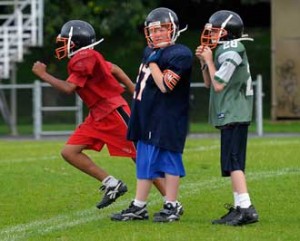
Redmen volunteers the “backbone” of ACES program, founder says.
By Jim Hynes
“Football is the bus. Graduation is the destination. That’s the way we work.”
That’s how Det.-Sgt. George Widz explains the philosophy of the youth football program he runs in some economically challenged neighbourhoods in the southwest part of Montreal. And since 2006, members of the McGill Redmen football team have been helping him drive the schoolbus.
Widz established the ACES (Action concertée en élaboration de solutions) football program in Point St. Charles in 1994. The 33-year veteran of the Montreal police force spent the latter part of his career at Station 15 looking on is dismay as more and more area kids dropped out of school and, inevitably, ended up in trouble. Fifteen years ago, Widz, a lifelong football player and fan, decided to do something about it.
“The dropout rate in our area is horrendous. We hear numbers like 34 per cent but I think it’s actually much worse,” Widz says “The best example I can give is Honore-Mercier high school in Ville Emard, which the program became involved with last spring. There are seven Grade 7 classes there…and one Grade 11 class. So what do you think the dropout rate is? Something is wrong here.”
The ACES program works mainly with area elementary schools, although it recently started working with high schools too. Why elementary schools? Because that where the problem begins, Widz says. “Kids don’t become dropouts in high school. Dropping out is a process that starts as early as Grade 1 or 2 with kids who can’t compete. As these kids advance in school, they tend to disappear.”
The Redmen players do their part by serving as instructors in the ACES Spring Program, weekly training sessions that serve to feed the ACES teams which play in the summer and fall. About a dozen players volunteer each year.
“McGill football players are the ‘haves’ of the world, and not the ‘have nots,’ “says Sean Dougherty, the McGill quarterbacks coach who hooked up with Widz five years ago. “George needed young coaches and I had access to 70 to 100 football players, some of them with great coaching abilities, and others who I thought needed to be a part of something like this. It was a good fit for everyone.”
The ACES approach is a simple one: Stay in school, be a good citizen, and you can play with us.
“If they are not going to school and getting in trouble, they will not be a part of the ACES, that’s the deal,” Dougherty says. “And the funny thing is, because some of them are street kids, they want to be a part of something, whether it be gangs or something else. With these kids there can be an apathy towards school, but be to be a part of something like this is huge for them. We try to make it fun so that the kid wants to come back the next week and the week after and eventually wants to get on to a team.”
Former Redmen wide receiver Tim Kraemer was part of the first group of McGill players to begin volunteering his time and has returned every year since. The Terrebonne native, who graduated last fall with a degree in Physical Education and now teaches at Lower Canada College, hopes to keep helping in some capacity.
“It was awesome just to be able to get out there and help out,” Kraemer says. “These kids don’t have a lot, so just to give them your time makes them happy. They love football too, and I really liked spending time with the kids. Sometimes just giving a bit of your time is all it takes.”
And Widz says he couldn’t do it without Kraemer and his Redmen teammates.
“If the kids from McGill weren’t there, this program wouldn’t exist. You can’t just go out and find 15 adults at 4 o’clock in the afternoon who are free to take care of kids. They are the backbone of this program. For 2 1/2 months, two or three times a week, we put kids with role models, Widz says.” And just through their contact with these great young guys from McGill they realize, ‘Hey, maybe I have a chance. I can do this.’ ”
